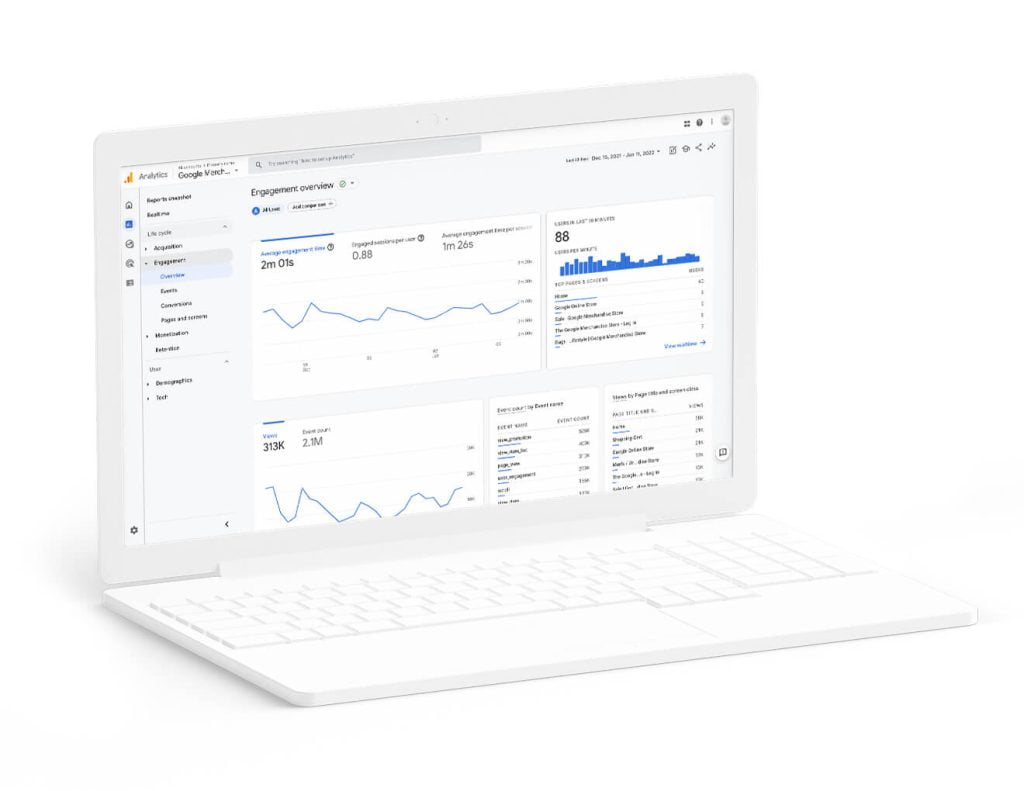Website success depends not only on what you present but also how it’s presented. Your website’s performance can make or break your online presence. In this article, we’ll dive into seven essential website performance metrics that can elevate your website to new heights and ensure a pleasant and memorable online experience for your visitors.
Table of Contents
Why Website Performance Matters
Website performance is all about how well your website performs when users visit. It’s not just a matter of aesthetics; it directly impacts the user experience, which, in turn, affects your business’s bottom line.
Think about it this way: when you walk into a physical store, you expect it to be well-lit, clean, and organised. The same applies to your website. If it loads slowly, has broken links, or is confusing to navigate, your visitors will leave and probably won’t return.
Let’s delve into why website performance is crucial for your online success:
- First Impressions Count
Just like a friendly greeting at a physical store, your website’s loading speed is the first impression you make on your visitors. If your site loads slowly, you risk losing potential customers right from the start. - High Bounce Rate
A slow or confusing website often leads to an increased bounce rate, which is the percentage of visitors who leave after viewing only one page. Reducing bounce rates can significantly boost your website’s success. - User Experience is King
The overall user experience is a powerful website performance metric. If your website is slow, difficult to navigate, or full of errors, it’s a recipe for steep bounce rates and lost conversions. - SEO Matters
Google and other search platforms favour fast, well-optimised websites. Slow websites can lead to lower search rankings, reducing your visibility and potential traffic. It’s important to ensure that your site is optimised for search engines.
Identifying the Right Website Performance Metrics to Track
With the importance of website performance established, it’s time to explore the top seven website performance metrics you should be tracking. These metrics provide valuable insights into how your website is performing and where improvements are needed.
1. Site speed
Website speed is the time it takes for your website to load. Slow load times frustrate visitors, resulting in a poor user experience and potential loss of business. A fast-loading website can make a significant difference. Tracking metrics such as page load times, server response times, and the number of requests a website makes can uncover areas that need improvement.
2. Time to First Byte (TTFB)
TTFB is the time it takes for a web server to respond to a request from a web browser. A long TTFB can slow down your site and frustrate users.

3. Website engagement
Engagement metrics like time spent on site (average session duration), the number of pages viewed (pages per session), and the percentage of returning visitors indicate how well your website engages visitors.
4. Bounce rate
High bounce rates can signal problems with your website’s content or user experience. Tracking this metric can help you identify and address issues. Aim for a bounce rate of 40% or lower to ensure that your website content is engaging and valuable to users. If your bounce rate exceeds 60%, it’s a signal to assess your page content and enhance its user-friendliness. According to SEMRush, in e-commerce, a high bounce rate typically starts above 45%, while in the case of blogs, it may be significant when surpassing 90%.
5. Conversion rate
Conversion metrics, such as the number of visitors who complete desired actions like making a purchase or signing up, are crucial for measuring your website’s effectiveness.
6. Traffic sources
Track where your website’s traffic comes from to understand which marketing channels are driving visitors. This insight allows you to focus your efforts on high-performing channels, leading to improved website performance and higher conversion rates. Use tools like Google Analytics for valuable data on your traffic sources.
7. Mobile optimisation
Given the increasing number of users accessing websites via mobile devices, optimising your website for mobile performance is essential. Metrics like mobile load times and mobile bounce rates are worth tracking.
The Impact of Page Speed Metrics
Let’s zoom in on one of the most critical website performance metrics: page speed. Your website’s loading speed, also known as site speed, plays a pivotal role in your online success.
not only does website speed impact user experience, but it also influences your SEO efforts
Picture yourself visiting a website, and it takes what feels like an eternity to load. Frustrating, right? Now, imagine your customers experiencing the same frustration on your site. Your site’s speed affects everything, from your bounce rate to your conversion rate. A fast website keeps visitors engaged and encourages them to explore further, leading to better chances of conversion. On the flip side, a slow website can be a real deal-breaker.
Google prioritises fast-loading websites in its rankings. So, not only does website speed impact user experience, but it also influences your SEO efforts. That’s a double win for a faster website!
Monitoring Website Performance
Now that you understand why website performance matters and have a grasp of essential performance metrics, it’s time to discuss how to monitor and improve your website’s performance. Monitoring performance metrics can help improve your website by identifying areas of improvement. For example, if your bounce rate is high, it may indicate that visitors are not finding what they are looking for on your website. By analysing the metrics, you can make changes to your website design and content to better meet the needs of your visitors.
Tools for Website Performance Monitoring
Fortunately, there are several tools at your disposal to help you keep an eye on your site’s performance. These tools provide valuable insights into how your website is performing, allowing you to make informed decisions and optimisations.

- Google Analytics: A powerful, free tool that tracks website traffic and user behaviour. It provides insights into how visitors interact with your site, helping you understand what works and what needs improvement.
- Website Performance Testing Tools: Services like Pingdom, GTmetrix, and WebPageTest allow you to test the performance of your site from different locations and devices. They provide detailed reports on load times and other performance metrics as well as provide you with an overall website performance score.
These tools offer valuable insights into your site’s performance, helping you identify areas that need attention so you focus on performance optimisation.
Enhancing Your Website’s Speed
Now, it’s time to roll up your sleeves and get to work on improving your website’s speed. Faster websites lead to better user experiences, higher search engine rankings, and improved business results.
- Optimise Your Website Images
Large, uncompressed images can significantly slow down your website. Use image optimisation tools to reduce file sizes while maintaining quality. MCloud9 users can also take advantage of image optimisation plugins available for many CMS platforms. - Minimise HTTP Requests
Every element on your webpage, including images, stylesheets, and scripts, generates an HTTP request. Minimising these requests can help your site load faster. Combine and minify CSS and JavaScript files to reduce the number of requests. - Use Browser Caching
Browser caching allows a user’s browser to store a version of your website, so it doesn’t need to reload the entire page on subsequent visits. This significantly improves load times for returning visitors. - Content Delivery Network (CDN)
A CDN distributes your website’s content across multiple servers, reducing load times for users in different locations. MCloud9 offers seamless integration with popular CDNs, making it easy to enhance the performance of your website. - Regularly Update Your CMS and Plugins
Outdated software can lead to security vulnerabilities and decreased performance. Ensure you keep your CMS and plugins up to date to benefit from performance improvements and enhanced security. - Optimise Your Web Hosting
Choosing the right web hosting provider optimised for speed and security is essential. High-quality hosting can significantly impact the performance of your website.
FAQ for Website Performance Metrics
What are website performance metrics?
Performance metrics are measurements that are used to evaluate the effectiveness and efficiency of a website. They provide insights into the performance of a website and help identify areas for improvement.
What are some key website performance metrics worth tracking?
Some key performance metrics worth tracking include page load time, bounce rate, conversion rate, average session duration, number of pages per visit, exit rate, and overall website performance score.
What is the best website performance metric to focus on?
The best website performance metric to focus on depends on your specific goals and objectives. However, page load time is often considered one of the most important metrics, as it directly impacts user experience. A slow-loading web page can lead to frustrated visitors and increased bounce rates.
What are some other website metrics I should monitor?
In addition to the key metrics mentioned earlier, you should also consider tracking metrics such as organic search traffic, referral traffic and social media engagement. These metrics can provide valuable insights into how visitors are finding and interacting with your website.
How often should I check website performance metrics?
The frequency of checking website performance metrics depends on various factors, including the size and complexity of your website, the amount of traffic it receives, and your business goals. In general, it is recommended to monitor metrics on a regular basis, such as weekly or monthly, to identify any trends or changes that may require attention.
In Conclusion
Website performance metrics play a crucial role in your success. By monitoring and optimising key website performance metrics, you can enhance your website’s speed, user experience, and overall performance. Remember, a fast and user-friendly website can lead to higher search engine rankings, lower bounce rates, and increased conversions.
So, whether you’re an entrepreneur embarking on a new online business journey or a seasoned blogger looking to boost your online presence, make website performance a priority. With the right metrics, monitoring tools, and optimisation techniques, you can create a high-performing website that stands. And if you’re in search of fast, reliable hosting to support your website’s success, MCloud9 is here to help. Explore our hosting solutions today to take the next step toward a high-performance website.


